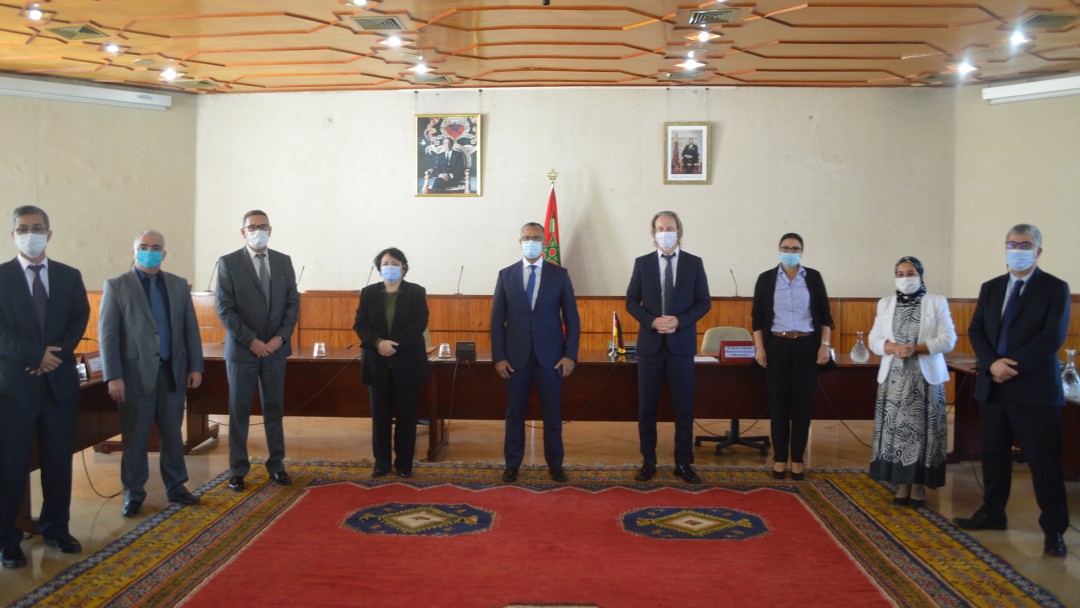News from 2020-10-07 / KfW Development Bank
Water and sanitation for the remote hinterland of Morocco

While the inhabitants of Morocco's cities and urban centres are increasingly benefiting from secure and sustainable access to drinking water, there is often still a lot of catching up to do in rural areas. Particularly in the north of the country, where infrastructure is weak, existing structures need to be expanded and innovative projects implemented. This is being done within the framework of the "Programme Rural Water Supply" in order to enable private households, public institutions and companies in Morocco's remote hinterland to have climate-friendly drinking water supply and wastewater disposal in line with Agenda 2030 and the human right to water. On behalf of the German Federal Ministry for Economic Cooperation and Development (BMZ) KfW Development Bank is providing the Moroccan partners with a loan of EUR 30 million for this purpose. The loan agreement was signed on 7th October 2020 by KfW and the project executing agency ONEE (Office National de l'Electricité et de l'Eau Potable).
The programme focuses on 450 small villages, known as douars, which generally have fewer than 3,000 inhabitants. In 150 of the 450 Douars, the KfW loan will be used to finance investment measures to improve the drinking water supply, and consultancy services will be provided to accompany rural drinking water projects at all 450 locations. The douars are located in the provinces of Tangier and Chefchaouen and adjacent areas and are not yet connected to a functional potable water supply system. In some cases the villages are supplied at great expense by water tankers, and the price is many times higher than the "normal price". Many villagers fetch their water from unsecured sources, often it has to be carried over long distances in canisters and buckets. Connecting these places will make a significant contribution to SDG6 - Clean Water and Sanitation. For the residents, a safe water supply also means improved health, economic development and thus a higher quality of life. Finally, the socio-economic gap between urban and rural areas will be counteracted - historically a major motive for rural exodus and social unrest. And: the provision of safe drinking water offers opportunities, especially for women and girls. Until now, they have to fetch water from distant springs and boil it at home. Valuable time in which girls do not go to school and women cannot pursue a paid job. This has had a long-term negative impact on gender equality. Thus, the project serves not only SDG6, but also SDG3 - "Health and Wellbeing" - and SDG5, "Gender equality". To ensure the inclusion and sustainability of the project, great importance is attached to involving the target group in all relevant decisions of project preparation and implementation.
As the project executing agency, ONEE, with the support of KfW Development Bank will start implementation from 2020. Specifically: the construction of transport pipelines with pumping stations, drinking water reservoirs, water distribution systems and house connections. The measures are designed to have a sustainable impact in terms of ecological, economic and social aspects. In a complementary measure, villagers are to be involved and sensitised. One measure concerns the planned establishment of an interactive service point, accessible both personally and digitally, which is to facilitate the dialogue between the executing agency ONEE and the target group and thus contribute to stronger customer loyalty and to improving the customers' willingness to pay.

Share page
To share the content of this page with your network, click on one of the icons below.
Note on data protection: When you share content, your personal data is transferred to the selected network.
Data protection
Alternatively, you can also copy the short link: https://www.kfw-entwicklungsbank.de/s/enzBWrMC.CU9A
Copy link Link copied